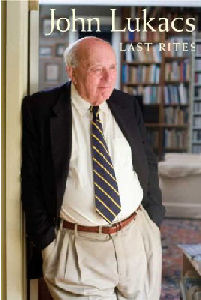
|
Posted December 7, 2008
Book: Last Rites Author: John Lukacs Yale Press, New Heaven, Connecticut, 2009. Pp. 187 An Excerpt from the Jacket:
Lukacs begins with a concise rendering of a historical understanding of our world, then follows with trenchant observations on his life in the United States, commentary on his native Hungary and the new meanings it took on for him after 1989, and deeply personal portraits of his three wives, about whom he has not written before. He includes also a chapter on his formative memories of May and June 1940 and of Winston Churchill, a subject in some of Lukacs’s later studies. An Excerpt from the Book: Vale, still my home, but not my “real estate.” Not even my own garden. All “real estate” is ephemeral now, no longer very “real.” But now a last peer into the future which rather fortunately than not — remains unpredictable. I am a historian, still. I do not know what will happen; except that I know some things that will not happen. The barbarians are now well within the — largely demolished — gates. But what happens will again depend on what people think happens — that will not change. How people think may change: but that, too, not much, except perhaps for a further shrinking of their attention span. Already it seems that “Information Technology,” computers, the Internet, blogs and e-mail did not and do not change much in the movement of ideas and in their consequences. Contrary to accepted ideas; the fear of “progress,” of the future will grow, and so will respect for the past. My readers: please turn toward the past, and dip into its records and remnants, for inspiration. By doing that you may turn melancholy: but you will not lose your appetite for life. Quite the contrary. Such is yet another proof of the mystery of the human mind, indeed, of our earthly existence. I regret that I am old. I regret that I fear the future and, yes, I fear a sudden death. I regret that my appetite for life has been weakening. I regret that so has my curiosity, my reading, and, together with that, perhaps even my very appetite for the past. But not weakening is my gratitude for the past. Ambition and greed invoke, they reach out to a future. Envy and pleasure insist on the present. But gratitude: it comes always from a past. There is my gratitude to the past, to my past, including those who loved me and whom I loved. Beneath and above them is my enduring gratitude to God, for both my past and my present. Will the sincerity of this gratitude suffice to escape His adverse judgment of me? I do not think so: I only hope. One last remark — now not about my life but about those Bad Fifteen Minutes. My conviction of the grand truth that I cited and repeated innumerable times in the past, writing and teaching latent within a profound Portuguese proverb: “God writes straight with crooked lines.” Everything made some sense — yes, everything. Sometime we may even glimpse that. “Clamat enim quodammodo omnis historia, Deus esse.” “In a way all history cries aloud that God is.” Table of Contents:1. A Bad Fifteen Minutes 2. Why? 3. The World Behind Me: My Adopted Country 4. The World Behind Me: My Native Country 5. Intermezzo: My Churchill Saga 6. The World Within Me: Wives and Loves 7. Ave Atque Vale |
|
